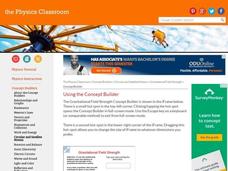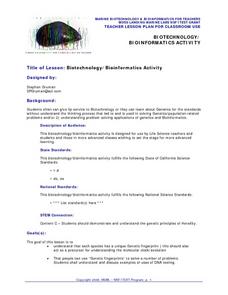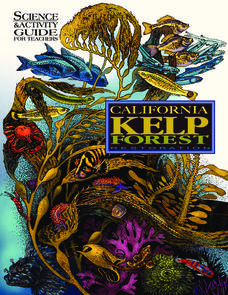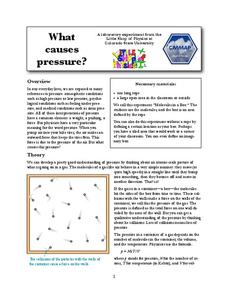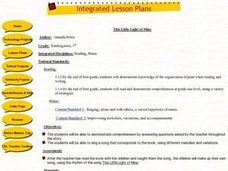Physics Classroom
Gravitational Field Strength
Budding scientists fall hard for a gravitational field strength activity! Physics pupils compare the masses and distances relative to the center of planets using an interactive from a Circular and Satellite Motion series. Individuals...
Rochester Institute of Technology
Molecules and Fuel Cell Technology
A fuel cell is where the jailer keeps gas guzzlers. Scholars review chemical reactions, chemical bonds, and chemical structure in order to apply these concepts. Participants construct fuel cell kits, using electrolysis to run the car and...
Howard Hughes Medical Institute
Using DNA to Explore Lizard Phylogeny
In a fun and interactive two-day lesson, learners sort anole lizard pictures by appearance. Next, they watch a video about the anoles and re-sort based on the information in the video. In addition to physical characteristics, budding...
Curated OER
A Close Encounter of the Tree Kind
Students study trees in their natural habitat. In this tree lesson plan, students complete a number of outdoor activities to estimate the height of a tree, examine how bark can be a distinguishing tree characteristic, and how to make a...
Curated OER
Open and Closed Circuits
Students distinguish between open and closed circuits. In this open and closed circuits lesson plan, students use their bodies as electric conductors and understand how electricity is a form of energy.
Curated OER
Biotechnology/Bioinformatics Activity
Students demonstrate the genetic principles of Heredity. They discover that each species has a unique Genetic fingerprint and that people can use "Genetic fingerprints" to solve a number of problems. They discuss examples of uses of DNA...
National Park Service
Subalpine Web
The theory of keystone species in an ecosystem was first established in 1969 by Robert T. Paine. Pupils open the final lesson in a five-part series with a game guessing which member of the alpine ecosystem they are based on clues. After...
National Woman's History Museum
Getting with the Program
A seven-step lesson introduces the emergence of computer sciences and the contributions women made to the profession after World War II. Several science experiments offer pupils a hands-on learning experience that showcases parabolas,...
Howard Hughes Medical Institute
Viral DNA Integration
How do viruses hijack our cells to produce more viral particles? Junior immunologists model how viral RNA integrates into a host cell's DNA using pop beads and use interactive tools to explore a virus' genome. The teacher's guide...
Dawn N . Ericson
California Kelp Forest Restoration
This unit is so cool, you won't be able to "kelp" yourself! Intended for all grades, this science and activity guide for teachers offers a unique opportunity to understand kelp's role as a valuable ecological resource. Teachers and...
Curated OER
Earthquakes: Kindergarten Lesson Plans and Activities
Beginning with a pre-lab, kindergarteners trace the letters in the word earthquake and discuss what happens in an earthquake. The lab portion allows young scientists realize that earthquakes trigger shaking of different intensities...
Colorado State University
What Causes Pressure?
Are you feeling the pressure? Let loose a little with a kinesthetic activity that models molecular motion in a closed space! The activity varies conditions such as volume and temperature and examines the effects on molecules.
Curated OER
Ethics In The Science Classroom - Pine Barrens
Students explain the complexities of environmental decisions, rather than to recreate the actual circumstances and outcome of the original case. They simulate a real environmental case a regarding the Pine Barrens of Long Island, NY.
Concord Consortium
What Is a Chemical Reaction?
Take your class inside a beaker for an up-close view of a chemical reaction! Junior chemists examine how chemical reactions occur using an interactive resource. The activity allows users to change the temperature and observe how it...
Concord Consortium
Seeing Specific Heat and Latent Heat
What happens inside a melting solid? Prospective physical chemists observe a solid-to-liquid phase change at the molecular level using an inspired interactive. Pupils add heat to a close system, then monitor changes in kinetic and...
University of Colorado
Designing an Open Spectrograph
Take the class over the rainbow. Pairs or small groups follow directions to create a spectrograph. The pupils measure the angles formed by the different colors of the spectrum along with calculating the lengths formed by the spectrum and...
Curated OER
This Little Light of Mine
Elementary schoolers discover how electricity travels and create an electron flow through a closed circuit. They work together to make a closed circuit and observe the electricity being made. This outstanding lesson plan is well worth...
American Chemical Society
Powder Particulars
By both demonstration and hands-on investigation, physical science fanatics come to know that some materials react when they come together. Adding vinegar to both baking soda and to baking powder, the difference between the two is clear....
Curated OER
Fossil Fuels (Part I), The Geology of Oil
Junior geologists work through three mini-lessons that familiarize them with the formation and location of fossil fuels. Part one involves reading about petroleum and where it comes from via a thorough set of handouts. A lab activity...
American Chemical Society
Exploring Moisture on the Outside of a Cold Cup
As a stand-alone or as part of the intended unit, this is a valid investigation of what causes condensation to occur. By limiting the amount of air around a cold cup of water and comparing it to one out in the open, they find that...
Exploratorium
Jacques Cousteau in Seashells
Visionaries create images out of dots to demonstrate the eye-brain connection. Through this activity, they learn that the brain interprets data collected by the eye into recognizable information. Search online for "Jacques Cousteau in...
American Chemical Society
Changing the Density of an Object - Adding Material
In this sixth of seven activities revolving around the concept of density, physical science fans figure out if anything can be done to change the density of an object. Demonstrate by placing a can of regular and a can of diet soda into a...
Columbus City Schools
Changes All Around Us
Whoa! What just happened? That's right, change is everywhere. But what exactly is changing? Middle school science sleuths get to the bottom of the changes matter can experience. Through simple demonstrations, engaging videos, and an...
Curated OER
Pooper Scooper
Science Students build a pooper scooper tool that helps them clean up after a dog without getting their hands dirty or their noses too close. They research the diseases that can be transported through animal waste and work in teams to...
